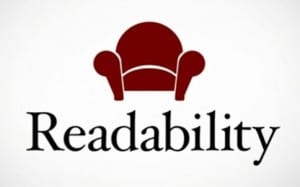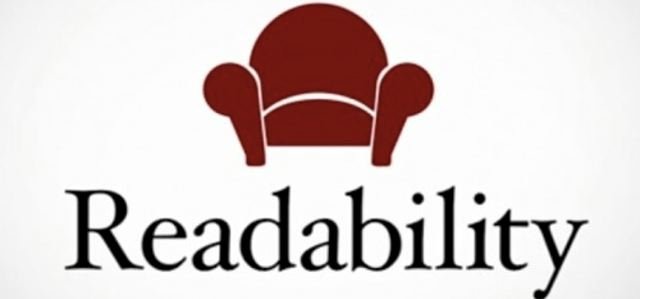Readability, Copyright and the Ongoing Struggle for Tech
 On Friday, the blog AppAdvice posted a scathing critique of the popular service Readability. In it, the blog took issue with how Readability handles sharing via its mobile apps, saying their that, “Readability’s current setup is tantamount to content theft”.
On Friday, the blog AppAdvice posted a scathing critique of the popular service Readability. In it, the blog took issue with how Readability handles sharing via its mobile apps, saying their that, “Readability’s current setup is tantamount to content theft”.
Readability is a service that works both on the desktop and on mobile devices to make it easier to read Web-based content. It’s primary function involves “cleaning up” a post by reformating the page to remove extraneous material, making the font more readable and displaying it in an easy-to-read (and easy-to-print) format. Readability does this by copying the article and hosting it on its servers, providing the user with a special “readable” link.
The issue AppAdvice raised involved the mobile apps. When sharing a link via the mobile app, anyone who clicked the shared link would be taken not to the original article but to Readability’s version of it. This is in sharp contrast to the desktop versions, which would send people to the original source with a Readability frame at the top (though that raises questions of its own).
Readability, however, responded quickly to the concerns and changed the way it handles sharing on mobile devices, directing users straight to the original article pending a more desktop-like solution.
However, this isn’t likely the end of copyright concerns for Readability. The service has long been controversial and much of the concerns aren’t going away. However, the challenges Readability face mirror the tech industry as a whole and they’re problems that are only going to get worse over the next few years.
The Threat of Readability
 Copyright challenges against Readability and similar services are nothing new. Many have been calling this kind of republishing “theft” for years. The main concern is that not only is the article copied and reposted, but advertising, analytics and other tools critical for earning revenue are stripped out as well.
Copyright challenges against Readability and similar services are nothing new. Many have been calling this kind of republishing “theft” for years. The main concern is that not only is the article copied and reposted, but advertising, analytics and other tools critical for earning revenue are stripped out as well.
Readability attempted to counter much of this concern through a revenue-sharing program that gives publishers some 70% of the money they collect. They also offer publishers the chance to opt-out by contacting them.
But for all of the controversy that Readability and its competitors have drawn, they haven’t reached the uproar level of Pinterest. This is largely because Readability is intended for personal use, meaning most links are just used by one person, the person that created them (whether they are reading it then or saving for later).
This difference also explains why there was an uproar over the shared links and why Readability moved so far to correct the issue. It also explains why Readability blocks search engines from accessing their copies of the articles.
But is Readability legal? That’s a tough question to answer without a good legal challenge. Though Michael Lopp (Rands) wondered this aloud on his Twitter (Hat tip: @Franky) but smart companies do everything they can to stay out of court, including doing their best address copyright concerns as they arise, even if the changes aren’t always adequate to quell the uproar.
Readability would most likely argue that its use of the articles is a fair use. Though the fact it uses the entire work is a strike against it, it’s not a death blow. Most of the case would likely hinge on whether the Readability version is adequately transformative and if it harms the market for the original work. Those are questions a judge and/or jury would likely have to wrestle with before we had any answers.
Unfortunately, for those interested in finding the answers, it’s unlikely we’re going to see any good challenges in the near future regarding Readability or its competitors. As such, the tech will continue to outpace both the law and the case law.
However, Readability and its competitors aren’t alone in facing these kinds of challenges. Much of the tech industry is right along side them.
The Copyright Challenges in Tech
Readability is just one of hundreds of companies out there trying to help users find, access, consume, organize, remember, share, discuss and interact with content on the Web. All of these companies want to do exciting things for users though the amount of concern they give content producers varies wildly.
Still, I don’t think that most of these companies, including Readability, Pinterest, etc. set out to try and screw creators an infringe copyright. However, in creating their products, they often do so, or at least are perceived to have done so.
Part of the problem is that, online there are as many views on copyright as there are creators of copyrighted content. 50% of all content creators might not be comfortable with something that the other half is fine with. But even if only 10% object, that’s still a very loud (and potentially dangerous) minority. Likewise, a vocal 10% the other direction can convince a company something is a great idea, even if it’s dangerous and stupid.
So how do companies balance this? Do they follow the law strictly, understanding that there are many gray areas within it that can only be resolved after an expensive lawsuit? Do they follow what the majority says is acceptable and hope the minority doesn’t sue or shout too loudly? Or do they just do what they think is right and hope for the best?
There are no easy answers here and few standard industry practices to offer guidance. With so many content creators, each with different views on sharing, business models, positions in their careers and desires regarding the Web, there’s no way to please everyone and it only takes one angry copyright holder to file a suit and ruin a company.
This is a big part of why tech and copyright have such a tenuous relationship. Combine a law with many gray areas and millions of perspectives of right vs. wrong and you have an environment where almost every company that interacts with the works of others should be nervous.
Those are things that are simply not going to change in the near future and it will create a very turbulent time for the tech industry and content creators alike over the next few years.
Bottom Line
This issue isn’t going away. The tech industry is going to continuously push boundaries as to what people can do with content and creators are going to push back when they think they’ve gone too far. Deciding where the lines are drawn has little to do with the skirmishes and more to do with the overall war.
In the meantime though, there’s going to be a lot of crossfire and a lot of well-meaning companies are going to get caught in it. Whether or not you call Readability one of those companies is a matter of opinion, but they won’t be the last company to try something new and find themselves at the center of controversy.
In fact, things are probably going to get a lot worse before they get better at all. In short, the fun has just begun…
Want to Reuse or Republish this Content?
If you want to feature this article in your site, classroom or elsewhere, just let us know! We usually grant permission within 24 hours.
